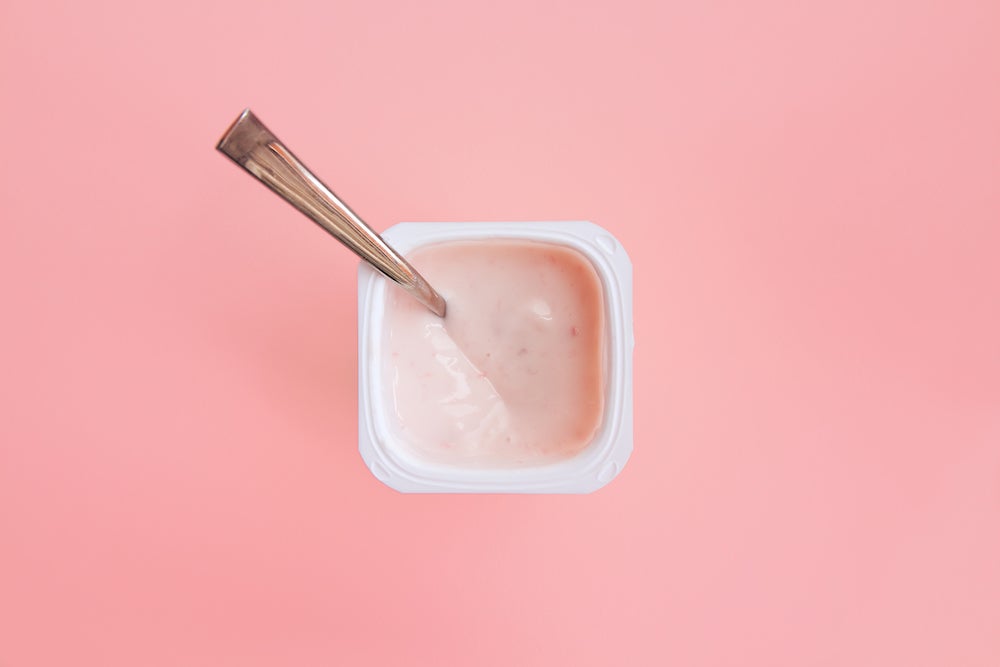
Do yogurt face masks work? Can yogurt help with hangovers? Many think yogurt is a cure-all. I went to the experts for the truth.
I grew up believing yogurt had limitless, bordering on magical, abilities. It could clear up acne, my mom told me, or help with a tricky bout of diarrhea. It could restore the depleted arsenal of good bacteria in your stomach after a course of antibiotics. It helped with memory loss! I suspected that some of these propositions were true; with others, I was skeptical.
So I put out a call on social media to see if other people’s parents had fed them similar lines about yogurt. As it turns out, there are a surprising number of legends centered on yogurt (and dairy more generally) floating around. With help from experts, and some deep digging, I went through each of these yogurt myths to find out which are based in truth and which are just folklore.
Eating yogurt aids in digestion.
FACT. This one is relatively straightforward. “The good bacteria in yogurt are known to influence good motility and maintain gut health through creating short-chain fatty acids, which aids normal digestion,” explains Dr. Rina Sanghavi, a pediatric gastroenterologist.
Yogurt can help clear your skin.
FACT (MOSTLY). “There are some preliminary studies to show that yogurt can benefit skin hydration and be soothing” when applied topically, says Marius Morariu, a skin-care formulator and the co-founder of Tracie Martyn Beauty. Yogurt has vitamins that can moisturize and smooth, and the lactic acid in it can be exfoliating and brightening for skin. Yogurt face masks are a go. The jury’s still out as to whether eating yogurt has any complexion benefits, though.

All yogurt has live and active cultures.
MYTH. While all yogurt is made using live and active cultures, which help to start fermentation, the National Yogurt Association says on its site that some companies’ processes involve heating up the yogurt to increase its shelf life, which kills the cultures and makes it taste less tart. Live and active cultures are what give yogurt a lot of its gut-related health attributes, so if that’s what you’re looking for, be sure to check the ingredient list.
Don’t eat yogurt before bed, otherwise you’ll get a cold.
FACT…ISH. Dr. Sangeeta Elhence, a pediatrician (and, um, my aunt), says she doesn’t recommend a lot of milk products right before bedtime for kids, as this often causes cough and reflux. But, she adds, “a small cup of yogurt before bedtime could actually help with sleep because of tryptophan in milk products.”
If you eat yogurt or other dairy with fish, you’ll get spots on your skin.
MYTH. Ayurveda, India’s ancient system of medicine, dictates that eating fish and yogurt can lead to a host of problems, including acne or indigestion. But Trupti Purohit, a registered dietitian, says this may just be an outdated tale—you can eat both with no issue. (FWIW, I have been eating yogurt and fish as part of the same meal for years, and no spots have shown up yet.)
Eat yogurt when you’re drunk, and you won’t have a hangover the next day.
MYTH. “I don’t think anything works for hangovers,” Dr. Elhence says. But there’s good news: “Alcohol is a known irritant of the stomach lining, so yogurt could help with stomach irritation.”
Taking yogurt alongside antibiotics will help restore the good bacteria in your gut.
FACT. Over to you, Dr. Elhence: “Antibiotics kill good and bad bacteria in the gut. Some of the side effects from antibiotics are because of lack of good bacteria. Yogurt has good bacteria that help replace them and reduce side effects from antibiotics.”

Eating pickles/lemons and yogurt at the same time will upset your stomach, since both are acidic foods.
MYTH. According to Dr. Sanghavi, “our body has a very sophisticated internal system for maintaining pH,” so eating acidic foods together shouldn’t have a negative effect.
Yogurt is good for memory.
FACT…ISH. A study done by the Kashan University of Medical Sciences in Iran indicated that the probiotics in yogurt can help Alzheimer’s patients guard against memory loss (though Dr. Elhence said this hasn’t been definitively proven).
Cooking or baking with yogurt destroys its health benefits.
MYTH. While heating up yogurt can kill off the live and active cultures that provide some health benefits, says Purohit, that doesn’t mean the yogurt is no longer nutritious: “The protein, vitamin, and mineral content should stay intact.”
Yogurt will make your sore throat worse.
MYTH. It very much depends on the person. “For some, anything cold or tangy can irritate the throat when one has a sore throat,” Dr. Elhence says. “Others like cold foods when they have a sore throat. Essentially, no harmful effects with yogurt and sore throats.”
Yogurt is a cure for diarrhea.
MYTH. There’s no evidence for this, Dr. Sanghavi says, since “it would depend on the cause of the diarrhea.”
Applying yogurt topically cures yeast infections.
MYTH (MOSTLY). According to ob-gyn Dr. Zarmina Aman, while yogurt contains lactobacilli (the friendly bacteria that helps to guard against yeast infections), it’s unclear how much actually needs to be applied to fix a yeast infection. She instead recommends going with a doctor-prescribed medication, as that’ll be tailored exactly to the type of yeast present in the infection you have. But eating yogurt daily, she adds, is a good way to prevent future yeast infections!
The Country’s Best Yogurt Column is an exploration of all things coagulated milk solids—how to cook with it, the fads that have surrounded it, and the many ways it has come to fit into our kitchens, grocery aisles, and restaurant menus.